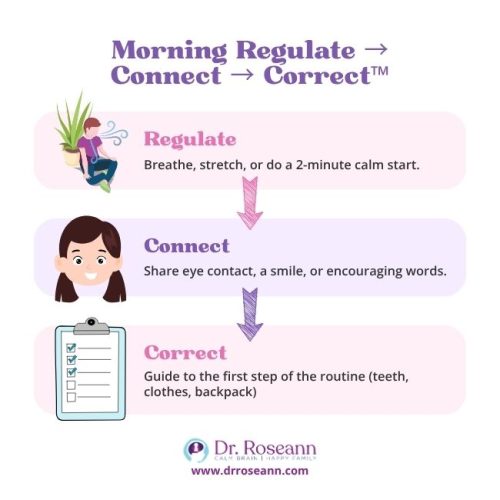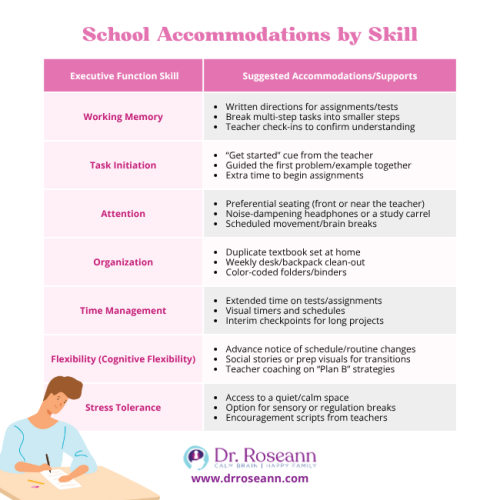When kids struggle with focus, meltdowns, and follow-through, teaching executive functioning skills—not pushing harder—is what changes everything.
If your child’s mornings feel like a tornado of reminders, tears, and lost homework, you’re not alone.
In one Ridgefield family, 10-year-old Sarah “stalled” at every step—teeth, clothes, breakfast, backpack. Once we calmed her nervous system first and added simple visuals, the chaos turned into a doable routine. Because behavior is communication, and the brain must be calm to learn.
Below, I’ll show you how to spot gaps, reduce stress, and build the brain skills that make daily life smoother.
12 Executive Functioning Skills—and Why They Matter
The 12 skills most families need to understand are:
- Self-regulation (inhibitory control)
- Attention
- Flexibility (cognitive flexibility)
- Working memory
- Planning
- Organization
- Time management
- Metacognition
- Goal-directed persistence
- Task initiation
- Sustained effort
- Stress tolerance
They draw on core processes—inhibitory control, working memory, and shifting/flexibility. These are shown across decades of research (Miyake et al., 2000; Diamond, 2013; Best & Miller, 2010).
Big takeaway:
If your child struggles with these skills, it isn’t about laziness—or your parenting. It’s about a brain that’s having a hard time regulating. Once we calm the brain, skills like attention, organization, and planning naturally resurface. That’s when kids can finally start, stay with, and finish tasks.
Signs Your Child’s Brain Is Overloaded
Instead of labeling your child as “unmotivated,” look for patterns that point to specific executive functioning gaps.
- Missed steps and directions → working memory weakness
- “Can’t get started” → task initiation challenge
- Stuck mid-task → sustained effort breakdown
- Big reactions to small changes → cognitive flexibility/stress tolerance
- Always late/lost → time management/organization
Parent story: Mae’s anxious 10-year-old melted down on school mornings. A fridge-posted “Now → Next → After” strip and a 3-step prompt (“Breathe. Start. Check.”) cut friction in half.
Takeaway: Visuals + co-regulation reduce stress so task initiation can happen.

Why Addressing Stress, Sleep, and Screens Matter More
Executive functions live largely in the prefrontal cortex, which develops across childhood and adolescence. This part of the brain is susceptible to lifestyle and nervous system stressors.
Common Drivers of EF Struggles
- Chronic stress, anxiety, or ADHD load
- Poor or inconsistent sleep
- Low physical activity, high screen time
- Mismatch between school demands and child readiness
- Medical/clinical drivers (OCD, ASD, PANS/PANDAS)
What Helps Right Away
- Regulate → Connect → Correct™: calm the nervous system first, then teach the skill
- Predictable routines and visual schedules
- One-step prompts, task initiation strategies, and movement breaks
- Parent co-regulation (your calm fuels their calm)
“It’s important to recognize both the unity and diversity of executive functions.” —Akira Miyake, PhD (2000)
Micro-wins That Build Big Skills At Home
Executive functioning in children grows through small, repeated wins, not marathon battles. Below are quick, parent-friendly ways to strengthen each skill.
Skill-By-Skill Quick Wins
| Skill | Practical Supports & Strategies |
|---|---|
| Self-regulation | 4-7-8 breathing before homework; calm-down corner with sensory tools |
| Attention | 10-minute “beat the buzzer” focus sprints; noise-dampening headphones |
| Cognitive flexibility | Rule-switch games (UNO variants); practice “Plan B” scripts |
| Working memory | 3 steps max; picture checklists; “Say it → Do it → Check it” |
| Planning | Backward-plan on a mini whiteboard; Sunday look-ahead; color-code |
| Organization | Backpack reset at 7 pm; one home for each item; labeled bins |
| Time management | Start alarms (not just due alarms); estimate vs. actual charts |
| Metacognition | Daily “2 wins, 1 tweak”; ask, “What helped you start today?” |
| Goal-directed persistence | Micro-goals (10 mins/day); track streaks; celebrate effort |
| Task initiation | Do the easiest 2 minutes first; “body double” (sit nearby) |
| Sustained effort | Pomodoro (25/5); snack + stretch between rounds |
| Stress tolerance | “Name it to tame it”; daily regulation practices (movement, breath) |
Parent story:
Marcus (12, ADHD) froze on multi-step homework. A “Now/Next/After” board + 10-minute sprints + snack breaks = fewer blow-ups and finished work.
Takeaway:
Visual sequencing + short sprints beat nagging.

How Schools Can Lighten Your Child’s Cognitive Load
Instead of asking schools to “fix” your child, focus on supports that reduce cognitive load. And explicitly teach EF strategies.
Match Supports to the Skill
- Working memory: Written directions, chunked tasks, teacher check-ins
- Initiation: “Get-started” prompts; guided first example
- Attention: Preferential seating, movement breaks, noise control
- Organization: Duplicate book set at home; weekly backpack cleanout
- Time management: Visual timers; extended time; interim checkpoints

When to Call Professional Help
Seek an evaluation when daily life, learning, or mood stays hard despite home and school supports. A clinician can assess EF skills and screen for ADHD, anxiety, mood, OCD, ASD, or PANS/PANDAS. This way, you target the root cause.
Parent story:
Priya’s teen was bright but chronically behind. After an evaluation confirmed ADHD with anxiety, targeted supports + regulation-first routines reduced overwhelm.
Takeaway: Name the pattern → pick the right supports.
How to Track Progress Without Adding Pressure
EFs grow across childhood and adolescence. Its progress accelerates when stress lowers and routines are consistent (Diamond, 2013; Best & Miller, 2010).
Track it like a scientist (but keep it simple)
- Pick 1–2 skills (e.g., task initiation, time management)
- Define success: “Starts homework within 5 minutes with 1 reminder.”
- Track daily checkboxes; review weekly
- Keep what works; tweak one thing at a time
Hope and Action: Moving Forward With Executive Functioning Support
What are the 12 Executive Functioning Skills? They’re the everyday brain tools that help kids start, stick with, and finish tasks—even under stress.
Remember: behavior is communication. When we calm the brain first, then teach one micro-skill at a time, kids and families change.
You’re doing better than you think. If you want a guided path, check out the Executive Functioning Parent Toolkit to see where to start.
Read more about: Children’s Executive Functioning: Hidden Keys to Calm and Success
FAQs About Executive Functioning Skills
How is executive dysfunction different from “not trying”?
It’s a skills gap, not a motivation problem. When we lower stress and teach steps explicitly, behavior improves (Miyake et al., 2000).
Will kids “grow out of it”?
EFs develop with age and practice. Consistent routines + regulation + explicit teaching = faster gains (Diamond, 2013).
What’s one thing I can try today?
Create a 2-step visual for the hardest time of day and add a timer. Start tiny; praise starts more than finishes.
Citations
Diamond, A. (2013). Executive functions. Annual Review of Psychology, 64, 135–168.
https://doi.org/10.1146/annurev-psych-113011-143750
Miyake, A., Friedman, N. P., Emerson, M. J., Witzki, A. H., Howerter, A., & Wager, T. D. (2000). The unity and diversity of executive functions and their contributions to complex “frontal lobe” tasks: A latent variable analysis. Cognitive Psychology, 41(1), 49–100.
https://doi.org/10.1006/cogp.1999.0734
Best, J. R., & Miller, P. H. (2010). A developmental perspective on executive function. Child Development, 81(6), 1641–1660.
https://doi.org/10.1111/j.1467-8624.2010.01499.x
Always remember… “Calm Brain, Happy Family™”
Disclaimer: This article is not intended to give health advice, and it is recommended to consult with a physician before beginning any new wellness regimen. The effectiveness of diagnosis and treatment varies by patient and condition. Dr. Roseann Capanna-Hodge, LLC does not guarantee specific results.
Are you looking for SOLUTIONS for your struggling child or teen?
Dr. Roseann and her team are all about science-backed solutions, so you are in the right place!
©Roseann Capanna-Hodge










